Das Racist And Other Friends I Never Made In College
by Annalisa Grier
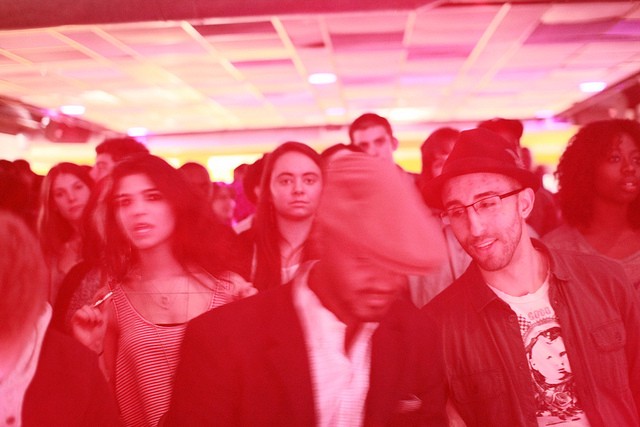
Since I’m a graduate student and drunkenness on a Thursday night is practically required, last Thursday I was terrifically far from sober and, as a direct result, read an article about Das Racist. I read this article because whenever Das Racist pops up on my radar, I read about them, like I read about MGMT even though I’ve only ever listened to MGMT once, and that was their song “Kids,” and, when I listened to it, it was about two years after “Kids” was a hit. I try to avoid dwelling on Das Racist, but, like I said, last Thursday I was drunk. Even when I’m not drunk, I have this terrible compulsion to read everything ever written about Das Racist because we all went to the same college, and because that fact signifies to me something particular, some life I wanted and didn’t have. This particular article said that Das Racist was pronounced Da-as, as in “That’s,” and it occurred to me that I’d always pronounced it in my head Dass, like “Ram Dass,” and how horrifying, because the members of Das Racist were practically in my year. (My internal voice is slightly histrionic.) Which at my university actually meant something, since it was a student body of 2,800 and everybody there seemed to know everybody, except for me.
I had hit college at 17 full of optimism that I’d find friends. I had a whole slew of them in high school and figured it would be easy to find new ones in college. We would do what college girls do: hang out in each other’s dorm rooms at night, talking, and there would be somebody lounging on the floor and somebody propped up on a pillow on the bed, and we’d stay up late and share makeup and maybe someday there’d be weed. How exciting! And then, as if it had been predetermined, and there was nothing I could do to change it: nothing. No friends, no late-night gab sessions. Nothing.
Nothing but hope, naturally: that the phone would ring or a message appear on my Facebook page with an invitation to a party, to coffee, anywhere. Many nights I would sit on the bed and watch my roommate get ready to go out. From the first week, this roommate and I had maintained a cordial, mutual hatred; we traded words maybe once every three days (I mean this quite seriously; “what’s up” was a big event). She sewed her own cosplay outfits and spent days drawing manga on her expensive tablet computer. The tablet was terrifyingly top-of-the-line, and I was jealous, of it and of her, a jealousy that intertwined with the raw loneliness I felt whenever I overheard her on the phone with her friends. I knew these girls only in passing but they clearly preferred her to me, and this appalled me: How, I wondered spitefully, can you prefer this girl? How is her weekend fully booked and why am I here, alone, working on my papers, studying too far in advance for a Japanese test, preparing to go to bed at 10 on a Friday night? Other nights, friends of hers would come over to play Dance Dance Revolution and I would bury myself in my laptop, pretending to do the week’s class reading while trying to pinpoint where I’d failed. This roommate, after all, had arrived as friendless as I had. How did she now have friends and I did not? (I’m not, I should note, in any way proud of these emotions, and the ways in which they contributed to my loneliness are surely numerous; it must be self-preservation at work to sense the ugliness of that kind of desperation coming off someone, and to flee it. But my aloneness was mixed up in my jealousy, my jealousy in my aloneness, until I could no longer have told you which came first, much less how to extricate them.)
But my aloneness was mixed up in my jealousy, my jealousy in my aloneness, until I could no longer have told you which came first, much less how to extricate them.
There were a few girls I talked to on LiveJournal (this was very much back in the day) with whom conversation never seemed to work in real life; or on Facebook, which was then in its infancy. They were too muddled, hesitant — too much, in other words, like me. The friend dates were brief and abortive. One day I walked to the magic shop (“shoppe,” please, and “magick”; a hand-painted sign and a display of tarot cards in the window) with one potential friend, of whom I had started thinking, almost clinically, as a kind of candidate. Halfway there she offered me a cigarette, which I turned down, and as we walked and she smoked I wracked my brain for something to say. We had already gone over (I listed in my head) her childhood in rural Montana, her coming-out experience in high school, her decision to attend our college, her selection of courses for the fall, her distant plans for New York City internships, etc. etc., as I enacted, one by one, my mother’s lessons on How To Be Interesting. Rule one: Ask questions! But I couldn’t figure out how to shape the questions into a conversation, the conversation into a friendship. Turning to her again with some vaguely formed query I saw her glancing at the dirt beneath her nails, then off at the trees, and I knew with absolute clarity that I had already lost her attention; my audition — my candidacy — was over.
I’m sure you — who are reading this, coffee in hand, a college grad yourself, maybe having suffered through a month or a semester of loneliness — were not like this; this is the precinct of the hopelessly pathetic, the domain of the pitiable. Or maybe you were like this, in which case, how did we not find each other? Or maybe we did, and we spoke, and we never spoke again. It’s hard, when you are friendless, not to resent the people who (you think) should be equally broken and bereft. I found myself looking at more people, not just my roommate, and wondering, “How does she have friends?” And yet! She did. They all did, these girls! They must have figured it out somehow during orientation, because they were everywhere: walking across the quad, buying movie tickets, climbing the stairs together at the campus center, making plans at the library. And yet for you, the friendless, it never went like that. You tried — you got out of your dorm room, you joined a club or two, you did activities, went to movie nights, talked to people in class, but it never worked. When you left, no one ever seemed to notice you going. And when you encountered these girls, making their plans on the library steps, you’d scurry past, pretending to be in a rush. You hated them, you wanted them; your jealousy was lodged in your skin like ringworm.
Now I read about Das Racist, feeling slightly furtive, reluctant to explain why I consume magazine profiles of a group whose music I don’t enjoy. The articles never fail to note that the members of Das Racist met at college; when I read this, I always envision them late at night in someone’s dorm room as the sun sneaks up on them. (My vision of this scene is vaguely homoerotic.) I imagine with a jealous pleasure that Das Racist had precisely the experience that would be summed up in the words “they met at college”: to my mind that phrase shorthands college as my peers (well-educated, ambitious, perpetually underemployed) knew it, or as they have recounted it: the red Solo cups, the eyeliner, the sweatshirts. This is college as I imagine it to be, the way I’d imagine it for a character in a novel, using for my descriptions something familiar I’d once observed but never done myself.
I wondered, sometimes, how this had happened: was it that my first-year roommate and I had hated each other so much; was that the reason? Was it because I had a boyfriend, whom I’d met during Orientation Week, and was too busy exploring the sexual freedom that comes with not having your mother walking up and down the hallway right outside your bedroom? I was spending all my time with him, and he with me, but he still had friends. How, exactly, had I missed out on the first year — the first week, even — when everyone else had settled into a group of likeminded people, like garter snakes into a ball? Where was I when Das Racist was meeting? While they learning each other’s phone numbers, while they were at the Spring Fling concert together on the hill in the middle of campus, watching Andrew W.K. and getting stoned?
***
In the Midwestern city where I come from, it would be hard for college to matter less. The first question any new acquaintance asks is “Where did you go to high school?” Your high school stands in for your neighborhood, your social status, your brains, your ambitions, and in this city I know the right answers. When I’m home, I speak the language; I understand the currency.
At least, it seems that way now, but of course I have to remind myself that it didn’t always. The friends I had in high school I only made after a year in which I wore the same Hard Rock Café Kuala Lumpur shirt and plaid pajama pants to school, braless and with unwashed hair, for thirty straight days. I could not be motivated to change my shirt or do laundry. At the end of thirty days I washed my clothes, then resumed wearing them like a uniform. For the months of that year I spoke to no one and went nowhere. I was, I suppose, in a depression; but I perceived it not as depression but as terminal aloneness.
The issue, as I understood it then, was whether or not I had someone I could call, without having to give it a second thought. People who have never been friendless do not know what this is like: that there is a brutally specific kind of dread that comes of knowing that, before dialing any person in your contacts list, you will have to draw on your dwindling store of courage, because you don’t know if whoever you’re calling will be happy to hear from you, or even instantly recognize your name. The friendless person can make no assumptions. The weekend, rolling out before you, is empty and terrifying: you run out of homework to do, and invent some. In college, you work two jobs, three, just to fill that space. You become the person who does not know how to pronounce “Das Racist,” since you have never, not once, heard the words spoken in conversation with your friends.
The issue, as I understood it then, was whether or not I had someone I could call, without having to give it a second thought.
But then, in the summer just before I turned sixteen, the darkness lifted as inexplicably as it arrived: I awoke, sitting in the back of someone else’s car, staring at the skull of a boy on whom I had just realized I had an intense, consuming crush. Within a month this boy and I were dating, and I had a group of friends with whom I spent nearly every waking moment. Still, this — the sudden brightening, the arrival of friendship — was not his doing. It just happened to occur when I was looking at him. There was someone I had been becoming, without knowing it, in the time I was coming out of the unwashed sadness, as the universe formed and reformed around me. The space filled. As much as I try I have never found the magic that needs to be worked for this to happen when you ask it to; the order of the universe changes, it seems, on its own, the flags are dropped, the engine gunned. Even now I don’t know how it happens, and could not replicate it; though, surely, I would pay good money to know.
***
I like to think I’ve left those years behind, locked securely away. And yet I read these articles about Das Racist, as if searching them for some hint about how to fix the person I was back then. How do you fix the brokenness of the past? I think about grad school, my current life; the people I am with now — by serendipity, by luck — are broken in the ways I’m broken, mostly. And we’re older now, and kinder. There were a lost four or five years, I guess. That should be the end of it, and yet my mind keeps circling, going over it again and again, to find the points where I could have made a choice, changed the future.
In my senior year of college, a girl I knew — were we friends? I wonder what the definition would have to be, for us to qualify; we lived together but often seemed in a state of bare toleration, our lives crossing occasionally at lunch and once or twice in the middle of the night as we snacked from the refrigerator — asked me if I wanted to write for this blog she was starting, about campus life at our university. I didn’t. The blog turned into a phenomenon. It’s still being published now, years after our graduation. It recently ran an interview with my roommate and a friend of hers, the founders. In the interview they mentioned the alumni listserv: “It’s so busy,” one said, that she actually had to unsubscribe. “The alumni are really connected,” said the other; “the alumni are all still friends now.” I read this with a monocle in one eye: studying it from a distance, turning it over, again and again.
I see in Das Racist (who, it should be said, never consented to be what I have made them: emblems, emissaries) something I thought I would be once, and never was; something I might have had a chance of getting, at some intersection, some fork I didn’t take. This reading I do, this recounting and dissection of the past (which is shameful, and which I hide) is worse, somehow, because of the ease with which I found friends at graduate school. I ask my friends, at our regular pub on a Tuesday evening, how they think we found each other, and they have no better answer than I do. Pushed, some of them recount the same experiences I had in college: weekend nights spent in our dorm rooms, a feeling that the rest of the collegiate universe had coalesced without us. But why us, why now, why are we sitting here with pints at our elbows, laughing? “Because we’re so awesome,” one of them says, which is heartwarming but not helpful: there is no key to it, nothing more than luck, the puzzle piece we didn’t expect to fit.
Annalisa Grier recently completed her MA in Pubs of Northern England.
Photo by LianaAn.
"Safe Slope" Will Walk You Home This Weekend, Ladies and Gays
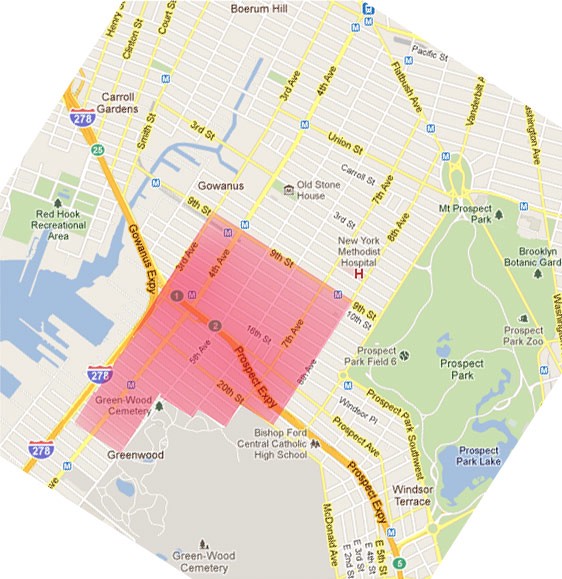
Safe Slope is up and running this weekend, offering accompaniment home for women, gay men and trans people. It’ll probably be a lot more effective against violence in the neighborhood than police officers telling women not to wear shorts, skirts or dresses. (FOR REAL.) Or also maybe not silently following women at night? To get an escort home after 7 p.m., call 347–709–8852. (That’s 347-SØY-TULB. Or 347-PØW-VULA. Hmm. Not so helpful. Maybe just program it into your phone now?)
Lady Nuts On Twitter Again
It’s cute that Ayelet Waldman going crazy on Twitter can still be considered news.
Julian Assange's 'Autobiography' is Just 50 Hours of Interviews
Despite acres of publicity and buckets of scandal, Julian Assange’s unauthorised autobiography sold just 644 copies last week.
Created with Assange’s cooperation (according to its publisher Canongate the Wikileaks founder spent more than 50 hours being interviewed for it) but published against his wishes, the book went on sale last Thursday amid widespread coverage and serialisation in the Independent.
— Wait. Did we “know” that Assange’s “autobiography” was based on “more than” 50 WHOLE HOURS of interviews? I mean, gosh, that’s 2.12 whole days! We probably did know that, but I guess maybe it was glossed a bit in the promotion? Fully ridiculous! Alice B. Toklas spent more time writing her autobiography. Also, sure doesn’t leave him with much of a copyright claim against the book, does it now. This guy!
Fish Opens Clam
“What the movie shows is very interesting. The animal excavates sand to get the shell out, then swims for a long time to find an appropriate area where it can crack the shell. It requires a lot of forward thinking, because there are a number of steps involved. For a fish, it’s a pretty big deal.”
— I’ll say! University of California ecology and evolutionary biology professor Giacomo Bernardi talks about the orange-dotted tuskfish he filmed opening a clam with the help of a rock. It is the first filmic evidence of tool usage by a fish. I can’t wait for the next scene, when the fish uses a fork to twirl up the spaghetti vongole he’s made for himself because it is impolite to slurp at the dinner table.
Twitter is Making the Brits Disgustingly American

I thought British people were allergic to self-promotion or, indeed, any kind of reference to oneself that was not heavily caked in self-deprecation. Doesn’t it make you break out in tea rash? Now look at you, instructing your Twitter followers to read your blogs, “check out” your articles, etc. This makes me suspect that Britain and all of its inhabitants have been swallowed up by an apocalyptic fire and replaced by an island of replicants who are planning world domination. Amirite or amirite?
Yet retweeting compliments is to harmless self-promotion what freebasing crack is to marijuana. And, going by this analogy, it grieves me to tell you — although I can’t deny that I rather enjoy typing it — that Joan Collins is a crackhead.
— Did Twitter export American narcissism to Britain? One woman (rather correctly) says yes!
Football Pick Haikus For Week 4
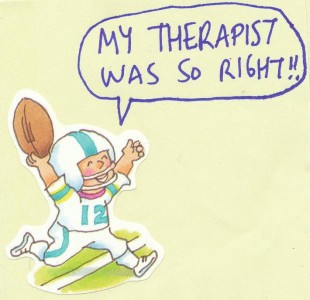
Sunday, October 2
At Dallas -1 Detroit
Everyone loves Detroit!
Are Lions Super Bowl-Bound?
Eminem Halftime! PICK: LIONS
New Orleans -7 At Jacksonville
Jaguars D not bad.
But Saints no doubt have a
Jones-Drew voodoo doll. PICK: SAINTS
At Philadelphia -8.5 San Francisco
Vick sick of hits.
Dream Team is a Scream Machine.
Philly Not Sunny. PICK: 49ERS
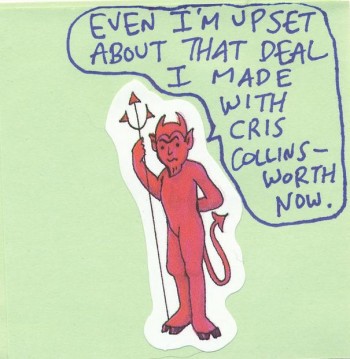
Washington -1.5 At St. Louis
Rams are awful.
But Redskins are still racist.
Change the team name, please. PICK: RAMS
At Cleveland -1 Tennessee
What’s worse? Cleveland’s D
Or Titans’ Britt-less offense?
Or Jim’s Crappy Picks? PICK: BROWNS
Buffalo -3 At Cincinnati
Bills at 3 and O
Cooler than Niagara Falls.
Totally Bill-lieve. PICK: BILLS
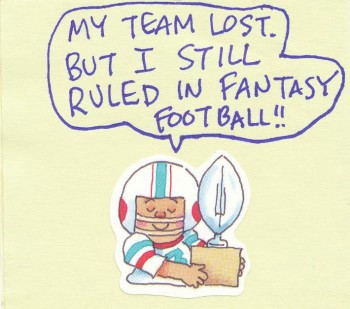
Minnesota -1.5 At Kansas City
Chiefs might play better
If you fire their whole team
And give their fans pads. PICK: VIKINGS
At Chicago -6.5 Carolina
Cam Newton versus
the legendary Bears D.
I will take the points. PICK: PANTHERS
At Houston -4 Pittsburgh
Texans suffer loss.
But Steelers look like they hate
running after yins. PICK: TEXANS
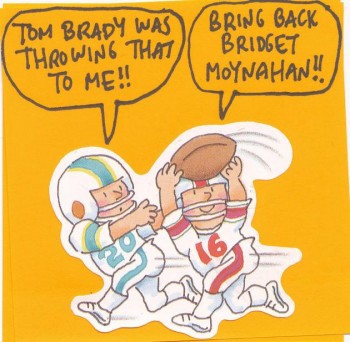
Atlanta -4.5 At Seattle
Crazy Seahawk Fans
Will make lots of Noise while Coach
Pete types Resume. PICK: FALCONS
NY Giants -1 At Arizona
The Giants winning!
The Cardinals defense is bad!
Lick some Oreos! PICK: GIANTS
At San Diego -7 Miami
Chargers turn it on
In October but I like
Dolphins’ uniforms PICK: DOLPHINS
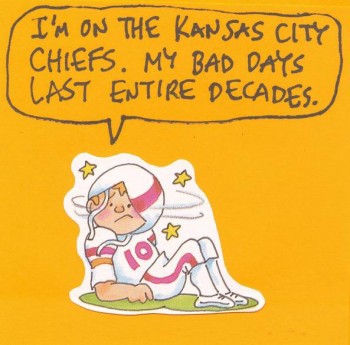
At Green Bay -12.5 Denver
After spending time
on the cross, Tebow rises
to help beat the spread. PICK: BRONCOS
New England -4 At Oakland
Tom Brady played Ugh.
Hasn’t won a Super Bowl
Since Gisele showed up. PICK: RAIDERS
At Baltimore -3.5 NY Jets
Ravens will win it
But only by a field goal.
Gang Green has gangrene. PICK: JETS
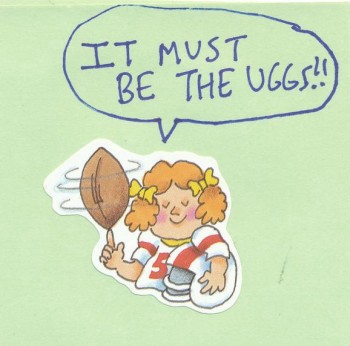
Monday, October 3
At Tampa Bay -10 Indianapolis
Peytonless Colts
Brutal ratings kryptonite.
Let’s watch “2 Broke Girls.” PICK: COLTS
Last week’s Football Haiku Picks went 5–11. Season to date is 18–28–2. Which is not so good. Yet.
Jim Behrle tweets at @behrle for your possible amusement.
Slate is Free from Its Cruel Master!

Profound congratulations to Slate for finally stabbing to death its creaky, ancient, and very angry CMS. Called “Gutenberg,” it was nearly as old as its namesake. The first rule of Media Club is: never build your own CMS. Someone will build it for you. Speaking of! Now someone is going to build me a Chrome extension to do for New Slate what “Ochs” does for the Times’ site.
Because THIS?
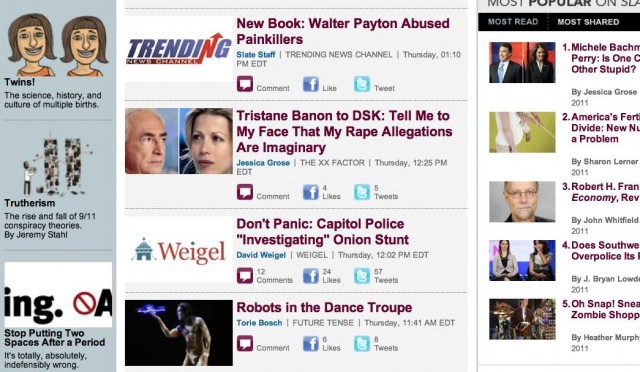
Ladies, start your coding please. (Also I would like a TimesWire for Slate. Which I guess I could build myself easily enough from their RSS but I have some important smoking to do. THANKS!!)
Skies Darken
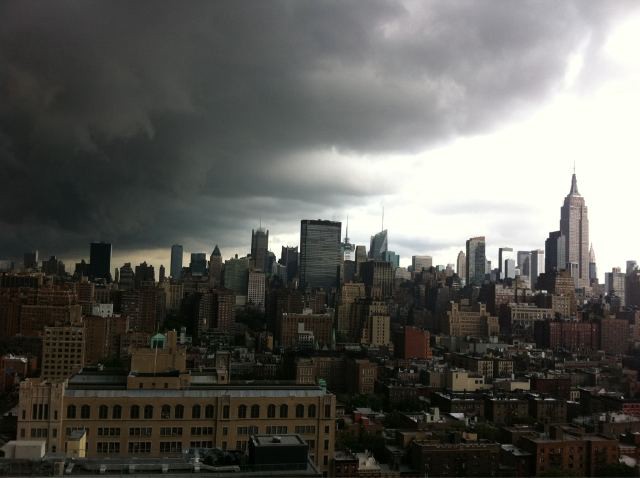
Fine, WHATEVER. Just rain already! And I mean a real rain this time. Sheesh. [Photo via]
